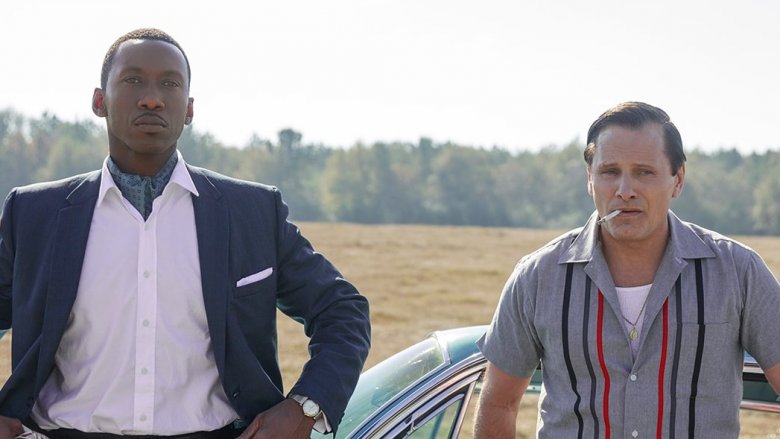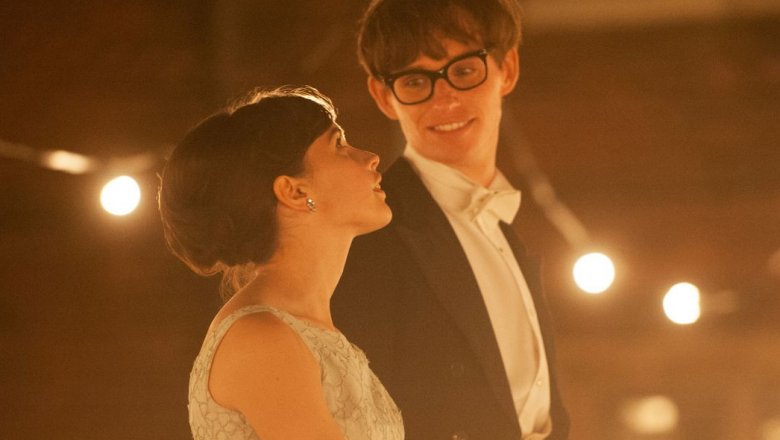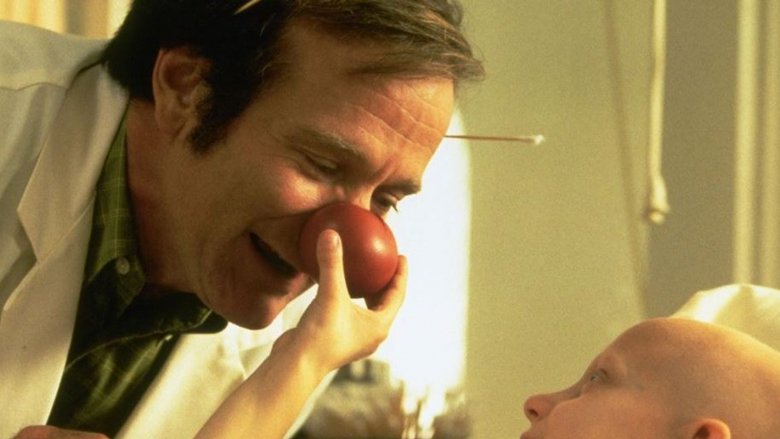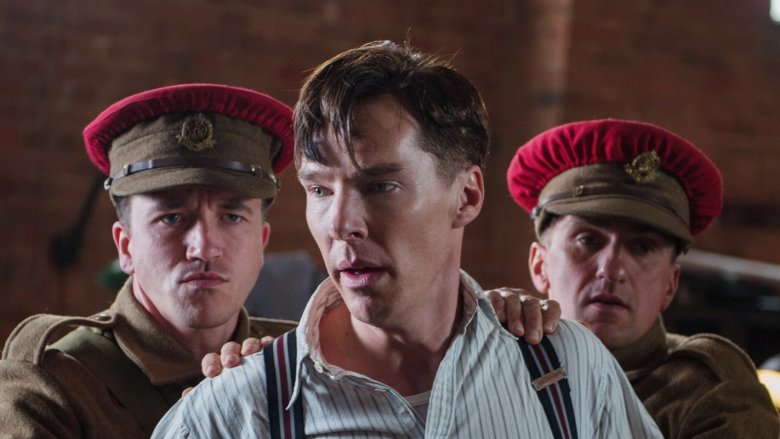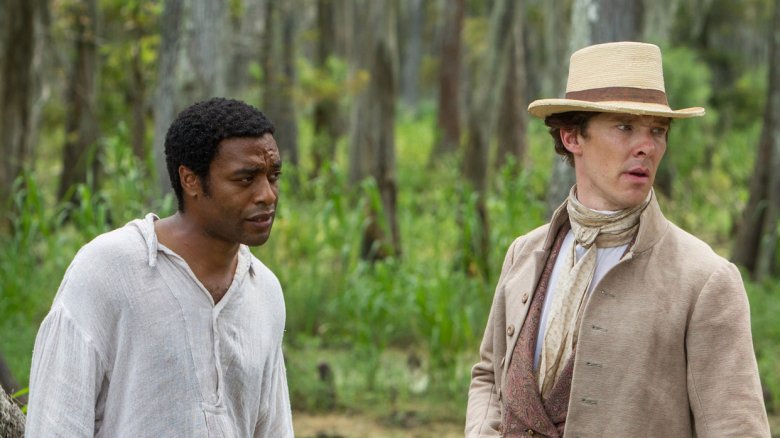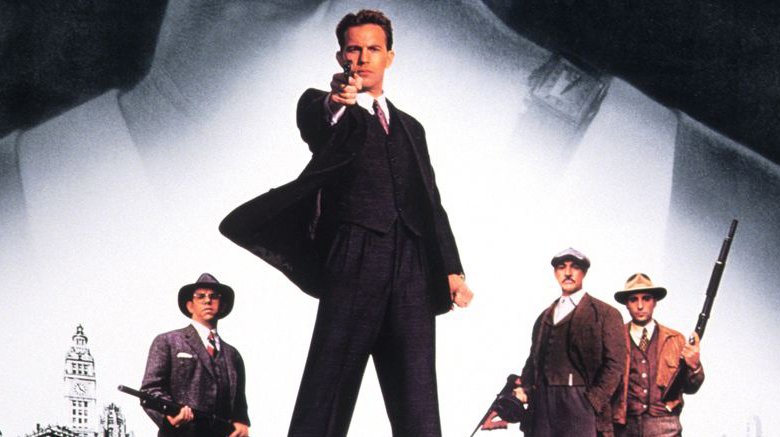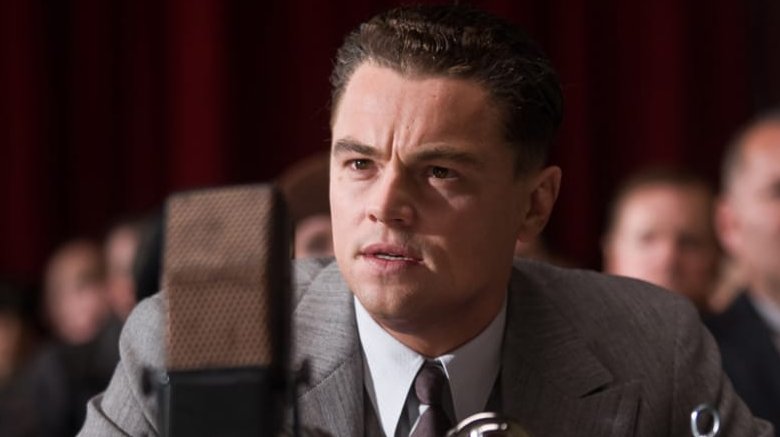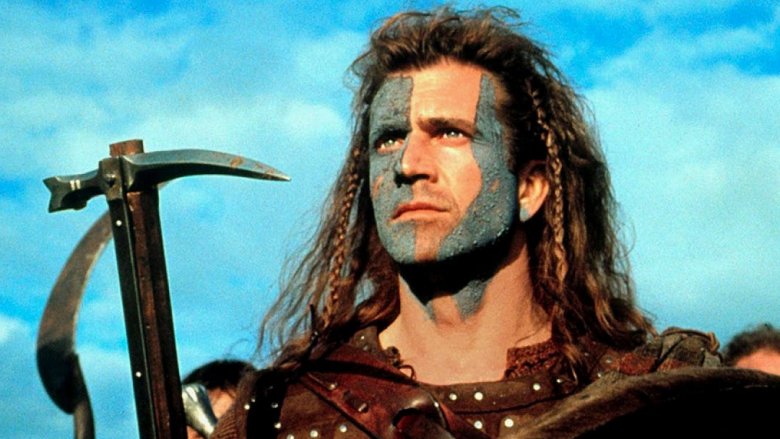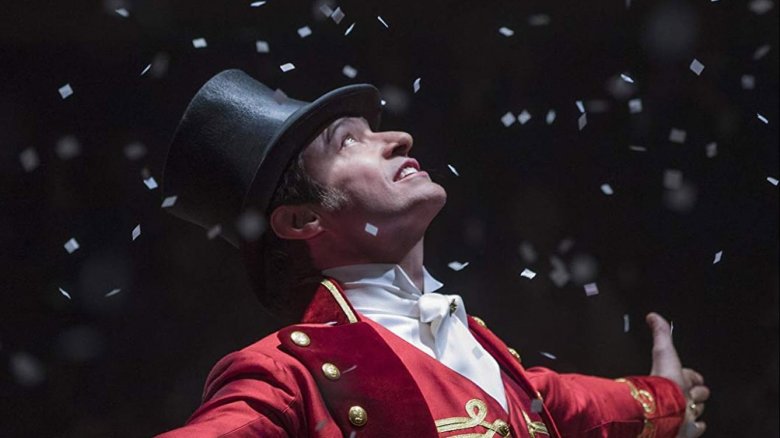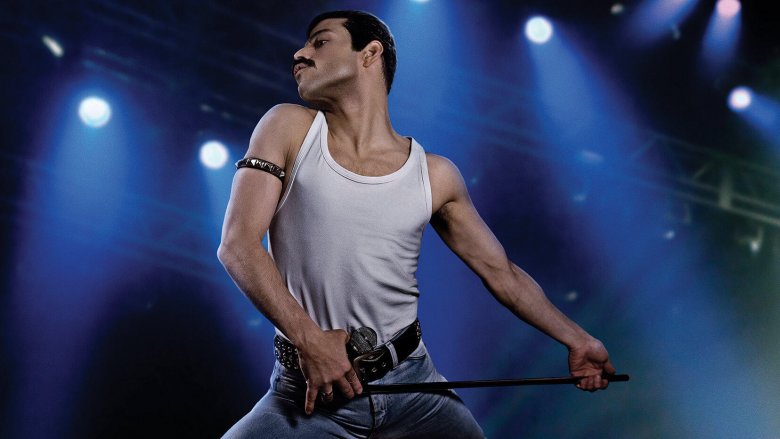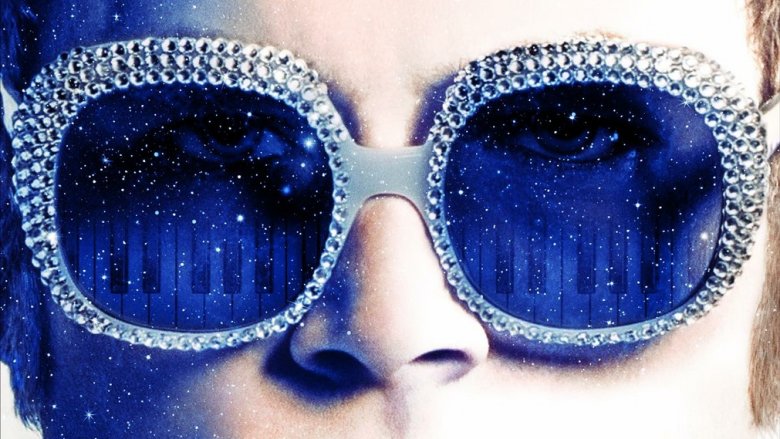Biopics That Lied To Your Face
It may shock you to hear this, but even with Hollywood's reputation as the capital of moral decency, a lot of what it produces isn't, strictly speaking, for realsies. Facts get stretched, stories get bloated, and the words "based on a true story" read as shorthand for "someone might have had the same first name as the main character, maybe."
This has become especially apparent in the increasingly popular genre of biopics. The tales of larger-than-life characters are routinely made, well, even larger than larger than life. Real people become distorted amalgamations of two or three folks, or are written out altogether. Other times, entirely new characters are created out of whole cloth. Sometimes P. T. Barnum is portrayed as a singing, dancing force for equality instead of a manipulative slave owner, but now we're getting ahead of ourselves. Here are a few of the times when biopics looked you dead in the eyes, promised not to hurt you, and then lied to your face.
Green Book: Not well read
Remember back when Crash won the Academy Award for Best Picture and everyone was up in arms about a preachy, poorly written piece of Oscar bait taking home a blue ribbon? How people said it was the greatest crime the Academy would ever commit? And then remember how the Academy asked us all to hold its beer for the next 13 years?
Green Book sort of told the story of kind of Don Shirley and maybe Frank "Tony Lip" Vallelonga. When the movie was released, it was dragging a U-Haul full of controversy behind it. Some people were disappointed that it seemed rooted in the outdated and well-worn story structure of "white racist goes on magical trip and totally gets what it means to be black at the end." For some of the family of Don Shirley, though, there were deeper issues. According to them, Shirley specifically stated that he didn't want Nick Vallelonga, son of Frank and co-screenwriter on the picture, to tell his story. More than that, though, they said that the portrayal of Shirley was at best flawed, and that the friendship between him and Frank was a fabrication, now famously calling the movie "a symphony of lies."
The Theory of Everything: All right in theory
Stephen Hawking was a lot of things to a lot of people. A visionary genius to some, an inspirational tale of mind over body to others, and to still others, that guy who played poker with Data on Star Trek: The Next Generation. For the sake of The Theory of Everything, he was Newt Scamander in Clark Kent glasses.
The Theory of Everything was based largely on the memoirs of Jane Hawking, Stephen's first wife, but it cuts a lot of unpleasantness for the sake of building up a likeable protagonist. For example, while the movie shows Stephen as being unaffected by fame and fortune, Jane described an intense personality shift in the professor, describing him as behaving like "an all-powerful emperor." She also said that, unlike in the movie, he became more resentful of her Catholicism as he got older.
Stephen's second marriage gets an airbrushing, too. Things between him and Elaine Mason, who he was with for 16 years, were at worst abusive (as his kids and staff alleged) and at best, um, "passionate." His words, not ours. Either way, things got weirder than the third act of an inspirational biopic is usually comfortable with.
Patch Adams: Sort of a joke
On the surface, it seems like the part Robin Williams was born to play — a sad-eyed funny man with the boyish playfulness and heartwarming personality to comfort the sick and bring joy to the dying. In retrospect, it was mostly just a drag.
1998 was an unusual time for Williams' acting career. His last two movies, What Dreams May Come and Good Will Hunting, put laughs in the backseat, favoring instead making movie theaters full of people sob until their skin flaked off from dehydration. Third in the trifecta was Patch Adams, the based-on-a-true-story story of the doctor by the same name who started a medical institute focused on zany hijinks as a facet of healing.
Thing is, the guy that Williams' character was based on is about a thousand percent more complex than the guy we see in the movie. Clowning around is just part of his philosophy: He's also deep into holistic therapy, ecological responsibility, and tarot. Some of his beliefs, like how love can fix mental illness better than medicine, are a little more problematic.
Hey, also, that girlfriend he had in the movie? The one who got murdered? She never existed. The real Patch Adams did that "room full of balloons" gag on a date with the woman he married. They were together for 21 years and had two kids.
The Imitation Game: Nearly cracked it
A lot of Alan Turing's life really was ripe for the Hollywood pickings. He really was a brilliant computer scientist and mathematician and is still considered father to the idea of artificial intelligence. The concept of a test distinguishing a human mind from a machine is named after him, and his work decrypting Nazi transmissions was a huge factor in the Allies winning World War II. He really was convicted of "gross indecency," a blanket term used to punish homosexuality under the Labouchere Amendment, and was sentenced to chemical castration by the country he helped to save less than a decade prior.
However! The Imitation Game took a lot of liberties with his story. For one thing, Turing didn't name his code-breaking machine "Christopher" after his old boyfriend, probably on account of how he was, as previously mentioned, smart. He called it "Bombe," much less alluringly, after another machine. He was also never blackmailed by the Soviets. The discovery of his lifestyle was a lot less "international intrigue" and more "whoops." He himself reported the burglary of his apartment and admitted to the police that he'd had a relationship with the suspect, Arnold Murray.
12 Years A Slave: Complicated
It's a difficult truth to come to terms with, especially with the 24-hour outrage cycle that the internet has become, but life is complicated and human beings are a multi-faceted hive of good and bad. People involved in the most heinous and unforgivable acts perpetrated throughout history also, pretty universally, had at least a couple of pleasant qualities. The world would be easier to digest if it weren't true, but Charles Dickens villains don't tend to exist in real life. But without them, movies would be harder to write.
All of that is a segue into the super uncomfortable topic of 12 Years A Slave's historical accuracy, specifically as it applies to Benedict Cumberbatch's character, William Ford. In the film, Ford is portrayed as a nightmarishly abusive taskmaster with a penchant for antithetical Christian sermons. Weirdly, the man who would've likely argued the most with this presentation was Solomon Northrup, the slave played by Chiwetel Ejiofor in the movie. Northrup wrote that Ford was a kind, "noble, candid, Christian man" who was caring and thoughtful, and recounted being saved by him on more than one occasion.
In contrast, Michael Fassbender's character was apparently even worse in real life, joyfully whipping slaves for entertainment. So maybe people really are trash after all.
The Untouchables: Drunk on grandeur
Back in the 1980s, in days long since forgotten, Kevin Costner was a movie star and people were willing to accept that every Sean Connery character talked like Sean Connery. And that, in a nutshell, is how we got The Untouchables.
Directed by Brian De Palma, The Untouchables is the (pretty much entirely fictional) story of Eliot Ness and his team of supercops working to take down Al Capone in Prohibition-era America. Jimmy Malone, the role that won Connery a Best Supporting Actor Oscar, was a complete fabrication. That scene where Capone beats a guy's head in with a bat at a Batman-esque gangster meeting? Definitely didn't happen. And Ness' involvement in Capone's eventual takedown over tax evasion was pretty well nonexistent. As screenwriter David Mamet said in an interview, "the real history isn't all that dramatic."
As a side note, one thing the movie did get right was Ness' excitement at the prospect of nabbing a drink after Prohibition ended. He lived and died a heavy drinker.
J. Edgar: Missed a spot
The 2011 biopic J. Edgar follows the shady, enigmatic life of one John Edgar Hoover, the first director of the Federal Bureau of Investigation. It stars a still Oscar-starved Leonardo DiCaprio as Hoover, and man, it was going to be a complicated story to tell no matter how they approached it. The movie makes a pretty huge deal out of Hoover's sexuality, painting him as a closeted homosexual who was held back from happiness by a strained relationship with his domineering mother. The truth is a lot more complex than that.
Hoover's sexuality has never been established. It's a point of historical speculation steeped in unknowns. Some historians will tell you he was involved in a relationship with Clyde Tolson, but others assert he was firmly asexual or, as his biographer believed, a terribly private heterosexual guy.
Whatever the case, the big lie in J. Edgar was one of omission: The FBI under Hoover's watch was deep into investigating gays as "potential security threats." They regularly tore people's lives apart in pretty huge ways, threatening to expose their sexualities if what they perceived as problem behaviors persisted.
The Doors: Open and shut
Oliver Stone has spent the last several decades causing the public to tilt their heads back and to the left in confusion. The guy has made a career out of creating semi-historical movies and documentaries based on controversial topics like the Vietnam War, the JFK assassination, and 9/11, all with varying levels of accuracy.
As an occasional palate cleanser, Stone has made flicks like The Doors, the 1991 biopic about the band of the same name. In it, Val Kilmer plays frontman and lizard king Jim Morrison. It's a haunting performance with more than a few high points. It's also, according to his old band mates, totes made up.
They weren't quiet about it, either. Pretty much as soon as he was allowed to, Doors member Ray Manzarek hit back publicly. He went so far as to say that "Oliver Stone assassinated Jim Morrison," giving Kilmer's performance a maybe-slightly-condescending "nice attempt" and calling the rest of the picture "sensationalistic." He said that while the Doors were all about love and understanding, Stone bent over backward to turn Morrison into a troubled, violent, unrecognizable jerk.
Braveheart: At least the fights were cool
Mel Gibson's turn as historical Scottish badass William Wallace was difficult to avoid in 1995. The story of a fiercely independent warrior who wouldn't take any guff was a smash hit, garnering Academy Awards and wild financial success. It's also, and this is important, mostly ridiculous.
Examples include: Wallace definitely didn't start the Scottish rebellion over the death of his wife, and he may not have been married at all. He wasn't a farmer, he was actually small fry nobility. And it's really, really unlikely that he got Queen Isabella pregnant, seeing as she would've been somewhere around 9 years old at the time, unmarried, and nowhere near England.
Honestly, the list goes on. The weapons and armor in the movie are anachronistic — especially the kilts, which wouldn't really be a thing for a few hundred more years. A lot of dates get muddled. Primae noctis is probably an urban legend. But with all that in mind, we still owe Braveheart a great debt for giving us that great "they may take our lives" speech.
The Greatest Showman: Three-ring lunacy
In 2017, Hugh Jackman, then the better part of 20 years into playing a superhero with cutlery for knuckles, decided it was time to put aside childish things. No longer would he play Wolverine, the unlikely leader of a group of social pariahs cast aside for their physical abnormalities. No, he was going to stretch his muscles and try something new: playing P. T. Barnum, the unlikely leader of a group of social pariahs cast aside for their physical abnormalities. But with singing this time.
The Greatest Showman is pretty far removed from reality, which isn't necessarily shocking considering how it is, unlike much of real life, a musical. Aside from that, there are plenty of discrepancies. The Zac Efron and Zendaya characters didn't exist, and if they had, Barnum's views on the inherent humanity of non-white people were, at best, super gross.
Exhibit A: When he was 25, Barnum (illegally) purchased an elderly slave named Joice Heth, whom he billed as the nurse to George Washington. Advertising her as 161 years old, he fed her a strict diet of whiskey and eggs to bring her weight down and then got her drunk and had her teeth pulled out. It was sort of what started his career, and weirdly, the movie sort of glosses over it, presumably because it's hard to turn a story about a white kid buying you and torturously forcing physical change onto your body into a song about loving yourself no matter what you look like.
Bohemian Rhapsody: Just fantasy
Bohemian Rhapsody was a movie that took decades to make and burned through multiple directors, writers, and actors before it hit the big screen. But you know what? It was all worth it just to see Rami Malek playing a two-hour game of "how many teeth can I fit in my mouth?"
Like lots of biopics, Bohemian Rhapsody paints the truth in broad strokes. Some stuff got reworked for time: Freddie Mercury didn't spontaneously do a back-alley audition to join the band, but he did spend a long time bugging Brian May and Roger Taylor, and in a move that mirrored what happened behind the scenes of the movie, the original singer was eventually replaced.
There were also small details, like how the band never actually broke up and the Mike Meyers character didn't exist. The most dramatic deviation from the truth, though, comes at the film's conclusion. Because Mercury was so tight-lipped about his diagnosis, details are murky, but it's generally accepted that he probably wasn't aware that he had AIDS until two years after the Live Aid concert.
So the emotional conclusion of the film where Freddie gets the band back together by cluing them in on his tragic circumstances never happened because the Freddy didn't know about his tragic circumstances and also the band wasn't even broken up. Cool soundtrack, though.
Rocketman: Not the man they think he is at home
Released in 2019 hot on the heels of Bohemian Rhapsody's success, Rocketman tells the story of Elton John, the popular music icon and first man in history to synthesize a rock made entirely from crocodile. The film starred Kingsman's Taron Egerton as Sir Elton alongside a cast of thousands of sequins.
As was pointed out by Rolling Stone shortly after the film was released, Rocketman takes a lot of liberties with the details of its subject's life. There are scenes set in one time period where he plays songs that wouldn't be written until years later, like his 1967 audition where he plays "I Guess That's Why They Call It The Blues," which wasn't, as historians say, a thing until the '80s. Anachronisms aside, the movie also tells us that our hero got his stage name from John Lennon when, in reality, he lifted it off of another musician he admired, Long John Baldrey. And if at any point while watching Rocketman, you thought to yourself, "Wow, that sure feels a lot more like a Hollywood thing than an Elton John thing," you were probably right. It probably didn't hurt that the movie was produced by Elton John's film production company.

